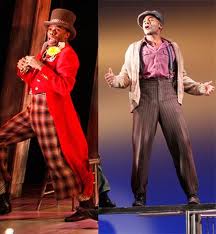In the Greater New York section of this morning’s Wall Street Journal, I review the Broadway transfer of The Scottsboro Boys, the new John Kander-Fred Ebb musical whose off-Broadway incarnation was one of last season’s most highly praised shows. I loathed most of it. Here’s an excerpt.
* * *
 I suspect that most of the younger people who come to see “The Scottsboro Boys” won’t know much about the Depression-era case that inspired the show, infamous though it once was. Very briefly, then, nine black boys from Georgia and Tennessee (one was 12, the others in their teens) who were riding the rails in search of work in 1931 were pulled off their train in Alabama, arrested by a local posse and accused of raping a pair of white girls who had been riding the same train. A few days later, having barely escaped lynching, they were convicted and sentenced to death. Their case became a nationwide cause célèbre, and the Supreme Court ruled that they had been denied due process and would have to be retried. But even though one of the women subsequently recanted her original testimony, five of the now-grown boys remained behind bars for years to come, the last one being paroled in 1950.
I suspect that most of the younger people who come to see “The Scottsboro Boys” won’t know much about the Depression-era case that inspired the show, infamous though it once was. Very briefly, then, nine black boys from Georgia and Tennessee (one was 12, the others in their teens) who were riding the rails in search of work in 1931 were pulled off their train in Alabama, arrested by a local posse and accused of raping a pair of white girls who had been riding the same train. A few days later, having barely escaped lynching, they were convicted and sentenced to death. Their case became a nationwide cause célèbre, and the Supreme Court ruled that they had been denied due process and would have to be retried. But even though one of the women subsequently recanted her original testimony, five of the now-grown boys remained behind bars for years to come, the last one being paroled in 1950.
In “The Scottsboro Boys,” Messrs. Kander and Ebb and David Thompson, the show’s librettist, have compressed this complicated sequence of events into a lengthy one-act musical that makes use of all the theatrical conventions of the old-fashioned blackface minstrel shows that were popular well into the 20th century. (Mr. Kander, who is 83, actually directed blackface shows at a Wisconsin boys’ camp in the Thirties.) Except for Mr. Cullum, who plays the master of ceremonies, the performers are all black, and most of the songs, which are written with a grasp of period style that will surprise no one familiar with such earlier Kander-Ebb shows as “Cabaret” and “Chicago,” are staged as grotesque parodies of the eye-rolling shuffle-and-grin style familiar to anyone who has seen films of Stepin Fetchit and Mantan Moreland…
“The Scottsboro Boys” would have been courageous had it been mounted on Broadway, or anywhere else in America, in the Sixties. In that long-gone decade, the prospect of watching a stageful of black men perform a “comic” minstrel show about so hideous an event would have stung like a flogging. But the intervening half-century has seen not only the election of a black president but the mounting of musicals like “Ragtime” and “Assassins” in which broadly similar theatrical techniques are used to identical ends, thereby robbing the caricatures in “The Scottsboro Boys” of their shock effect. I suppose there are places in America where such a show might still jolt its viewers, but to see “The Scottsboro Boys” on Broadway is to witness a nightly act of collective self-congratulation in which the right-thinking members of the audience preen themselves complacently at the thought of their own enlightenment….
* * *
The print version of the Journal‘s Greater New York section only appears in copies of the paper published in the New York area, but the complete contents of the section are available on line, and you can read my review of The Scottsboro Boys by going here.
Terry Teachout on the arts in New York City
An ArtsJournal Blog
